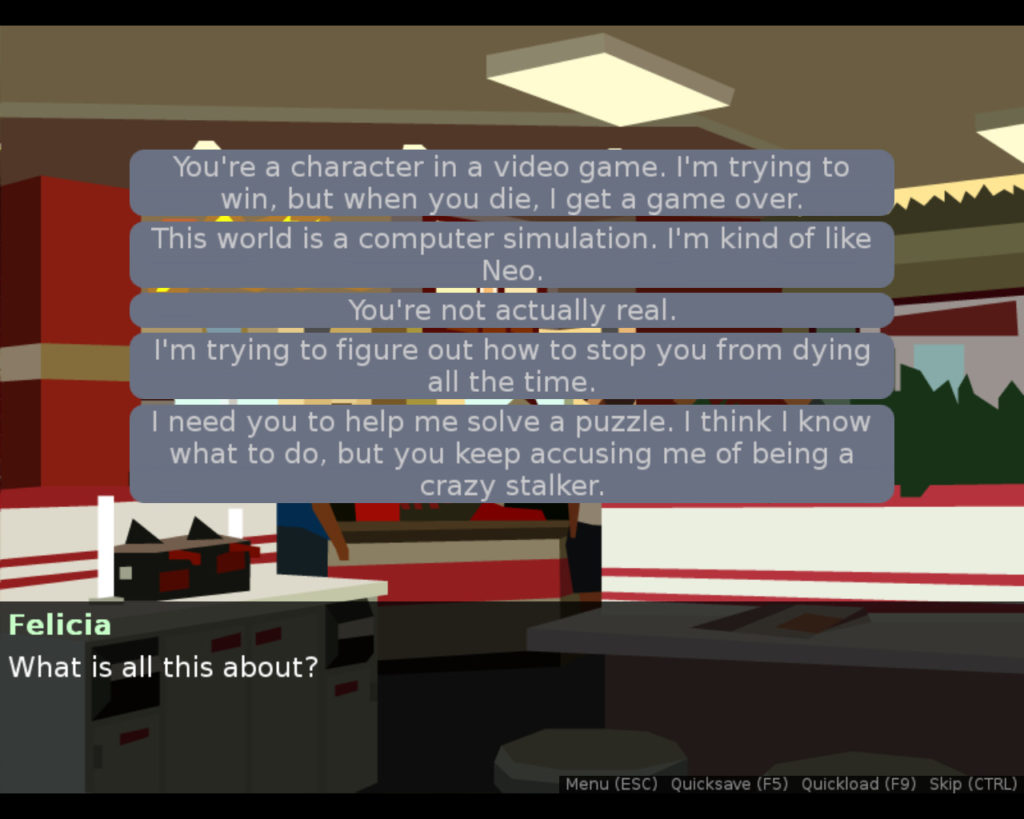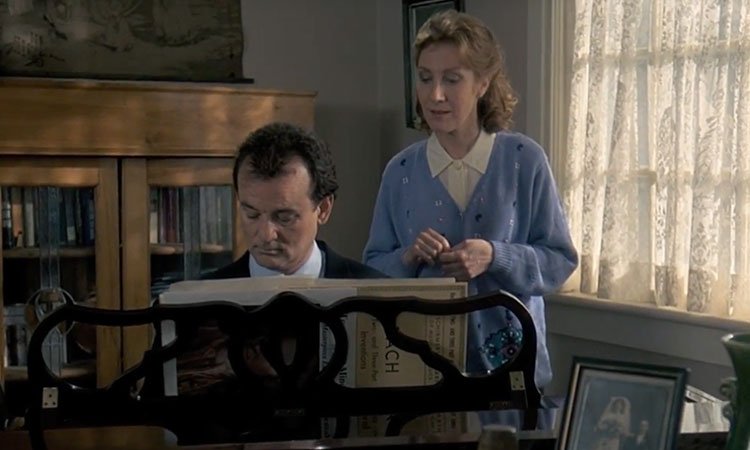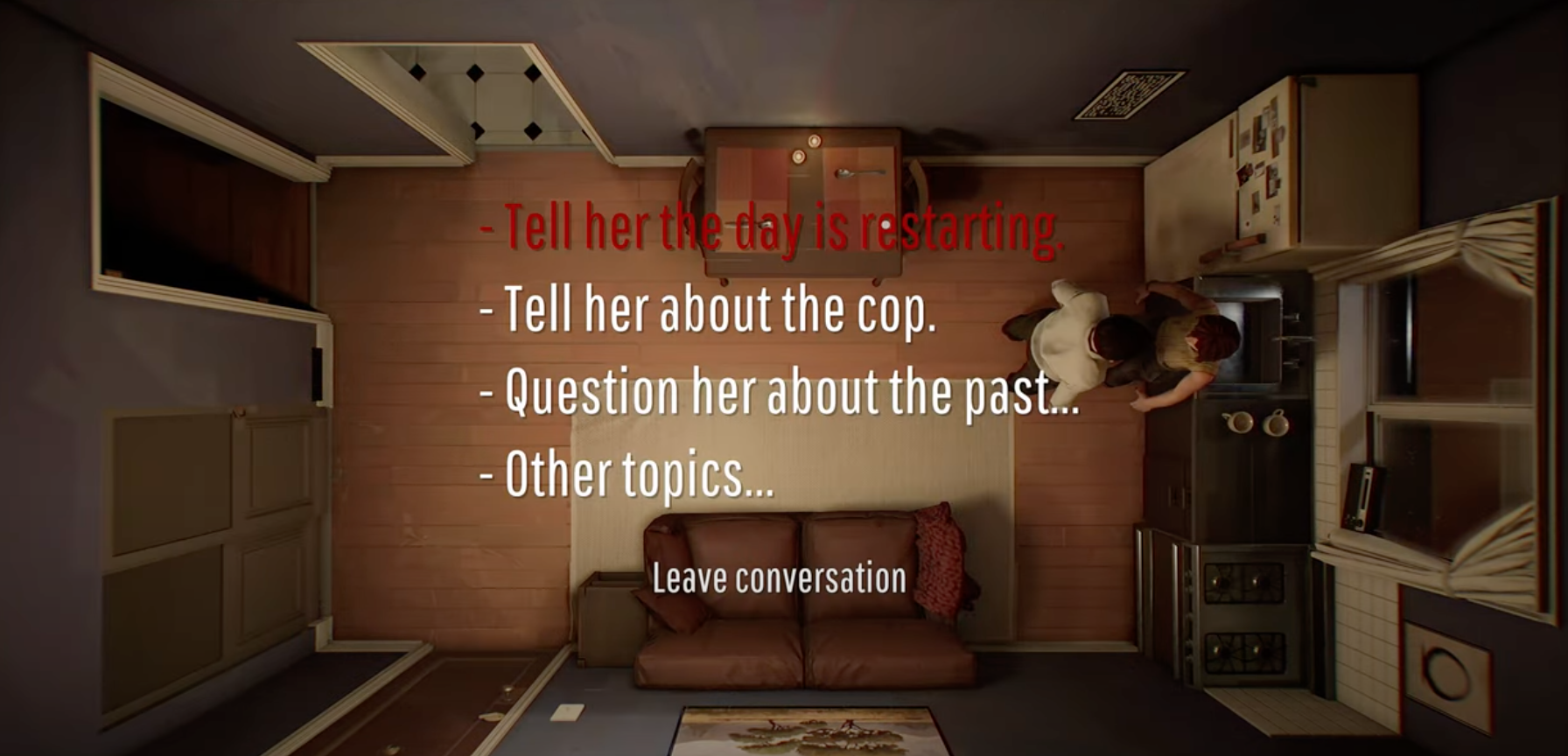In Twelve Minutes, the player character begins the game just as unaware as the player, going about his evening with his wife and celebrating their baby on the way with dessert, dancing, and being brutally murdered and robbed by a strange cop. Things understandably spiral out of control from there.
The player character (we will call him Husband for clarity) expresses confusion and distress at the day repeating itself at first. “What the hell just happened” “Didn’t you already say that?” “How is this possible?”
At this brief point in the game, there is dissonance between the Husband (player character) and the player. The player, who is most likely familiar with Time-Loop Media will quickly catch on to the time loop mechanics and understand that the game will repeat itself over and over and over and so on. The Husband, however, should logically be more confused and distressed than the player.
Here the realistic response would be for the husband to question his sanity and or lose sanity over time which he does partially. What’s more interesting here is immediately after the first loop new dialogue options open up “Tell her this feels like the same day” and “Tell her about the cop”. Instead of assuming what he experienced was a dream, lapse in sanity, or waiting to see if it was indeed real, he asserts what he experienced is unavoidable reality “So there’s a man at the door he’s going to say he’s a cop”.

And by the third loop “Tell her the day is restarting”. There is not a lot of room for uncertainty nor delay on the Husband’s part. Later in the game, he even remarks that he’s experiencing”some sort of Time-Loop”, and when he fails to end it he laments”I did everything right” indicating his awareness of some sort of win state.
In these reactions, he is demonstrating a sort of meta-awareness in which he knows that ONLY he knows is in a Time-Loop and that he is in a game of some sort. He learns the rules (how he gets ‘reset’ leaving the apartment, how he is ‘reset’ if he dies’ and mechanics ‘how time moves, how objects interact, how win and lose states are achieved) of the loop as the player does. In this, the player and Husbands knowledge of the game becomes one in the same amplifying player identification/relatedness.
While all of these observations could be gleaned by just playing the first few rounds of 12 minutes, it is important to note here that the Husband’s meta-awareness of the time-loop game tends to be a characteristic of the genre. Such as in Save The Date where you have more straightforward dialogue options such as “I reloaded from a previous save” and the more blatant “I’m trying to win, but when you die, I get a game over.”

There is even some intertextuality between Time-Loop media within Twelve Minutes. The player or main character’s loop being reliant on the death of a loved one and their attempt to stop or delay it is shared between many Time-Loop narratives such as Save the Date, 12 minutes, or the Mystery Spot Episode of Supernatural (a tv series). Sometimes there are even direct references within the media to other Time-Loop media, such as when Wife asks if Husband is going to take the extra time to learn the piano, exactly what Phil does in Groundhog Day.

All of this leads to the question of Meta-Awareness being a characteristic or a rule of the genre. Must the player/main character be aware of the time-loop in order to create a compelling narrative for the media? Could the player character be unaware of the time-loop and still count as a time-loop? Or is that just the same story being told over and over? Is it the connection between the frustration of the audience and the character that makes time-loops so potent and compelling, or is it something about the repetition of the loop that makes time-loop media popular?
There isn’t one true answer to any of these questions, however, it is important to keep them at the forefront of game design and narrative building in time-loop games, lest they become ironically repetitive.


This may have just been my experience, but when playing time loop games, I have a very strong aversion to the dialogue options which acknowledge that the game is looping. Personally, these options always feel cruel because I know that after my character explains the looping mechanic in this run, inevitably, that explanation will be wiped away. It also appears to be a theme, although Save the Date is an exception, that indicating to other characters that there is a time loop is ultimately futile. Therefore, in the “successful” runs of the game, you are always isolated in your awareness and any responsibility you may feel to enlighten the other characters falls into the background. I think this meta-awareness you are pointing out is how these kinds of games create a distinct kind of tragedy and horror in their narratives.
I completely agree with you on your point about the interrelatedness between metagame and time-loop game. I think characters in the time-loop does offer an important element toward meta-game.
I personally wouldn’t say it’s necessary for meta-awareness sometimes. You could take out the meta-awareness dialogue options and realistically play a similar game. The main character in 12 minutes would learn the same lesson, just without the experience of having to go through the same day to do so. I do think it’s a trope of the genre, as it makes it more obvious to players who may not understand what’s going on. I often feel like the dialogue tropes that talk about the repeating loop deter me, since the trope is that they’re not believed. There is a game based off Groundhog Day, where the main character tells someone about the loop, and they believe them since they had seen it before. It was quite refreshing and added a heartfelt touch. So I don’t believe it’s necessary to have meta-awareness, but does help players understand the situation they’re in.
I think your question of does the character need to be aware of the time loop a key part of it being a time loop is intriguing. It would also be an interesting comment on determinism or free will. If it was deterministic, then if the person isn’t aware of the time loop, they would just perform the same actions over and over again. Or if they were to change their actions, it could be an argument for free will because their actions aren’t predetermined. Alternatively, could the “deterministic” side necessarily rule out free will, so what if we choose the same things over and over again out of free will. Or I don’t know, I tend to confuse myself thinking on this. Also, I think in this case, a movie would be better because if the player who has seen the time loops played out will change the actions of the character even though the character wouldn’t be aware of the same information. Or perhaps that’s part of the game, the player makes the character do something they wouldn’t do and conflicts with who they are.